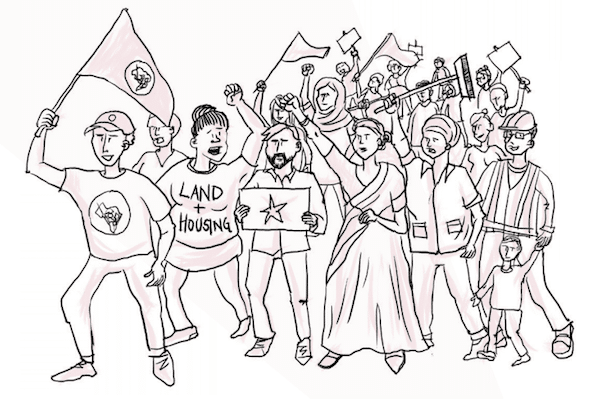by VIJAY PRASHAD

Every few months, Tricontinental will release a working document. These documents are intended to stimulate debate about issues of importance. Please use them as you see fit: reproduce them, translate them, and discuss the issues raised by them. We hope that readers find the series useful. We are always open to criticism and guidance, not only about the contents of the working document, but also about the form itself. If you have any comments about the papers, or would like to submit a document for the series, please write to vijay [at] thetricontinental.org or documents [at] thetricontinental.org.
Agaca balta vurmuslar ‘sap? bendendir’ demi?.
When the axe came into the forest, the trees said:
the handle is one of us.
—Turkish proverb
Raoul Peck, the Haitian filmmaker, opens his film—Der Junge Karl Marx (2017)—in the forests of Prussia. Peasants gather fallen wood. They look cold and hungry. We hear horses in the distance. The guards and the aristocrats are near. They have come to claim the right to everything in the forest. The peasants run. But they have no energy. They fall. The whips and lances of the aristocrats and the guards strike them. Some of the peasants die. Even fallen wood is not allowed to them.
Young Karl Marx, sitting in Cologne in 1842, is dismayed at the violence against the German peasants. The peasants, he wrote, know the punishment. They are being beaten, even killed. But what they do not know is the crime. For what crime are they being punished?
Peck is clever to open his film with this dilemma, for it is the question that every sensitive person should ask today. What is the crime for which the world’s poor are being punished? Poverty and war produce refugees of hunger and bombardment, but they are denied mobility, denied any exit from their predicament. They know the punishment that they face: indignity, starvation and death. This they know. What they do not know is their crime. What have they done to deserve this?
The Dominican-American writer Junot Diaz visited Haiti after the devastating earthquake of 2010. In a memorable essay titled ‘Apocalypse’, Junot Diaz noted that Haiti warned us of the new ‘zombie stage of capitalism, where entire nations are being rendered through economic alchemy into not-quite-alive. In the old days, a zombie was a figure whose life and work had been captured by magical means. Old zombies were expected to work around the clock with no relief. The new zombie cannot expect work of any kind—the new zombie just waits around to die’.
And the new zombie cannot be allowed to forage for food or to seek shelter or medicine. The new zombie, truly, must just wait to die. This is the punishment. But what is the crime?
Part 1: Structure
International Division of Humanity
Aadmi tha, bari mushqil se insaan hua.
We were people. With great difficulty we became human.
—Akbar Illahabadi
US President Donald Trump threatens to annihilate North Korea, Iran and Venezuela. This is the new Axis of Evil, a concept his predecessor George W. Bush used in 2002 but that then did not include Venezuela. It included Iraq, which the United States bombed in 2003 as part of its illegal invasion of the country. Since then, the U.S. has also destroyed Libya and other countries that include Haiti, now substantially under U.S. and UN occupation. Like a wounded dragon, the United States whips its tail across the planet and breathes fire on people—destroying countries, vanquishing its enemies. Its wounds are not fatal, but strategic. The United States still possesses the most powerful military in the world and is capable of destroying any country by aerial bombardment and by the use of weapons of mass destruction. But it uses this power in ways that do not always benefit its ambitions. Because the United States is the most powerful country in the world does not make it godlike; it has its own errors, which are to be carefully tracked by those who favour humanity over submission.
Monthly Review Online for more